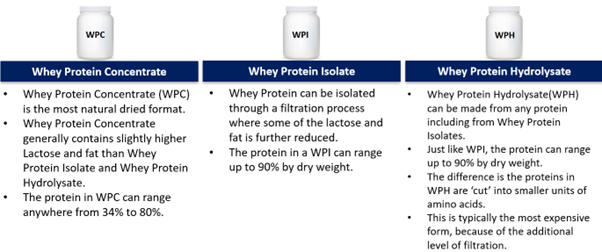 |||
|||
How Much Whey Protein Consumption is Safe?
How much whey protein is too much whey protein? Or how much whey protein per day is considered safe for consumption? Or how much should you even take. These are all questions that you might be having so let’s dive into it.
Let us first understand why people consume whey protein or protein in general.
Dietary protein is an essential macronutrient, which is required by all healthy adults on a daily basis. It’s imperative that all healthy adults consume adequate amounts of protein whether they are active or not. To begin, we look at protein from two different perspectives – one from a nutritional standpoint and secondly from protein in the body. Dietary proteins are essential as they help to provide building blocks of proteins within the body. After a protein is ingested, it has the potential to perform thousands of different functions within the body from structure, function and regulation processes. These proteins in the body support vital functions and they function far beyond just muscle. There are many specialized proteins such as collagen, keratin, actin, myosin and more. As a matter of fact, there are potentially over a million different types of protein found in the body with many more yet to be discovered.
Is Whey Protein Safe?
To understand if whey protein is safe, we first need to understand how whey protein is made and what’s in it.
Whey is a dairy protein derived from cow’s milk.
Cow’s Milk is comprised of about 88% water and variable amounts of all three macronutrients: 5% Carbohydrates, 4% Fat and 3% Protein. From that Protein, there are two main Proteins, which include Casein and Whey. Casein is the most abundant Protein at 80%, while the remaining 20% is Whey. Whey and Casein can be found in dairy products such as fluid milk, hard cheeses, soft cheeses, yogurt, and milk-based desserts like frozen yogurt and puddings.
How is whey protein made?
Whey and Casein are separated through the cheese making process. Either enzymes, heat or acids are added to liquid milk to begin the coagulation process. Generally, Rennet is added to milk to allow Casein and Whey to separate. The Casein will begin to thicken, which allows the Proteins to divide. From there, the liquid Whey is then pasteurized, then dried. Using different processing techniques, Whey can be made into these common forms of powder, which include Whey Protein Concentrate (WPC), Whey Protein Isolate (WPI) and Whey Protein Hydrolysate (WPH).

Whey is not made in some laboratory from some chemicals, chances are if you are someone who consumes milk and milk products, you are consuming whey without even knowing it. However, there might be some instances when whey might not be suitable for someone.
Medical History
Typically, for a healthy adults consuming whey protein in the recommended amount will cause no issue. In case of children/adolescents check with their paediatrician and in case of any pre-existing medical condition check with the doctor if the Whey based supplement is right for you.
Allergies/Food Intolerances
Whey protein is made from milk. People with known milk allergy should avoid consuming whey protein. In case of people with lactose sensitivity or intolerance, Whey Protein Isolate based supplements might be better suited as most of lactose (milk sugar) is removed during the filtration process used while making whey protein isolates. However not 100% of lactose can be removed so always check for “Lactose-Free” claim on the label and/or start with a 1/4th scoop and check your tolerance and work your way up to a full scoop gradually. In case of food allergies as well check with your doctor/dietitian first.
How many scoops of whey protein a day is safe for you? OR how much whey protein do you really need?
Typically for a healthy Indian adult even when not physically active you will need around 0.8-1-gram protein per kilogram of body weight. So, for example a 50 Kg weighing healthy adult will need 40-50g protein per day. Now if you exercise and depending on intensity of exercise your protein needs can go as high as 1.5- 2grams of protein per kilogram of body weight, so the same 50 kg adult might need up to 100g of protein.
A carefully planned Indian vegetarian diet even without supplementation can provide up to 40-50 grams of protein. A supplement such as whey comes in handy to provide you those extra grams of proteins which helps you meet your now increased protein needs.
Typically, a scoop of whey protein will provide ~24 grams of protein. So, depending on you your diet, exercise levels and goal you might need 1-2 scoops of whey protein. Consult with your registered dietitian who can help create a personalised diet plan for you.
Dietary Protein
When it comes to protein consumption, you should always follow a food first approach. Try and eat a balanced protein rich diet. There are multiple food sources that provide dietary protein. Such as- Animal Protein Food Sources- Eggs, Chicken, Meat, Fish, Milk and Milk Products Plant Protein Food Sources- Lentils, Daals, Soy, Soy Products, Nuts
Take Home Message
How much whey protein you need to, or you can consume depends on your diet, physical activity levels and goals. 1-2 scoops a day works for most people but always work with a registered dietitian who can personalize you diet and work the supplementation in it for you. Typically, consuming whey protein for a healthy issue should cause no issue. In case of any medical issues or food allergies consult with your doctor.
